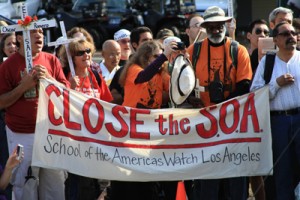SOA Watch, the grassroots movement to close the SOA, has documented countless cases of human rights abuses perpetrated by the school’s graduates. Each year, the Vigil to Close the SOA brings together activists from across the hemisphere to demand a shutdown of the school and share experiences and strategies for resisting militarization.
Among the SOA’s more than 60,000 alumni are notorious dictators Manuel Noriega and Omar Torrijos of Panama, Leopoldo Galtieri and Roberto Viola of Argentina, Juan Velasco Alvarado of Peru, Guillermo Rodriguez of Ecuador and Hugo Banzar Suarez of Bolivia. In El Salvador, SOA graduates were responsible for the El Mozote massacre of 900 civilians, the assassination of Archbishop Oscar Romero, and the massacre of 14-year-old Celina Ramos, her mother Elba Ramos and six Jesuit priests at the University of Central America. More recently, SOA graduates participated in the attempted coup against Venezuelan President Hugo Chavez in 2002, and the coup that deposed Honduran President Manuel Zelaya in 2009.
The weekend’s events began on a crisp Friday morning in Lumpkin, GA, home of the Stewart Detention Center, a privately owned prison that holds around 2,000 immigrant men for deportation proceedings. This year marked the fifth annual vigil to close Stewart Detention Center, organized by Georgia Detention Watch in collaboration with other state and national human rights organizations. Speakers addressed the connection between exploitive U.S. military and economic policies and the influx of immigrants from the Global South. The recently reunited Guzman family told a crowd of 270 people their efforts to finally free Pedro Guzman, who spent 20 months in the Stewart Detention Center before being released in May. Pedro and his wife Emily Guzman expressed their thanks to the movement that supported them, and vowed to continue their fight for human rights for all immigrants.
Moments later, activist Chris Spicer from Chicago, IL, crossed the police barricade in an act of civil disobedience in solidarity with the immigrants detained within the prison walls as the crowd sang in support. Event organizer Anton Flores was wrongfully arrested at the close of the action after media and legal observers had left. Despite video evidence proving Anton did not trespass, the police refused to stop harassing him, and only after the evidence was presented to Judge Wayne Ammons were his charges dismissed.
The following day, demonstrators gathered at the gates of Ft. Benning, GA, in a joyful celebration of resistance. Musicians regaled the crowd with songs of solidarity, while speakers encouraged activists to stand strong in their struggle to end militarization. Combining protest and public education, vigil attendees also participated in workshops that addressed the effects of militarization in the U.S. and abroad.
“We’re here this weekend because inequality and oppression continue, and the School of the Americas plays a role in that,” said Jimena Paz, a leader in the Honduran resistance movement. Paz addressed a group of about 50 people at a workshop on the ongoing human rights crisis in Honduras since the coup.
“In my country, SOA graduates continue to repress social movements that stand up against a coup led by graduates of this school right here in Fort Benning.”
On Sunday, musicians sang out the names of those killed by graduates of the School of the Americas as the crowd joined in, staging a symbolic funeral procession in front of the entrance to Fort Benning. Actor Martin Sheen stated, “I’m delighted to be here with the reminder that lost causes are the only causes worth fighting for, and nonviolence is the only weapon to use to fight with.”
Georgia NAACP State President Edward DuBose, United Auto Workers President Bob King, Honduran afro-indigenous doctor and community organizer Dr. Luther Castillo, and community organizer Jani Silva from La Perla Amazonica, Putumayo, Colombia also took the stage to address protesters. The diversity of voices reflected the movement’s greatest strength–its commitment to a plurality and solidarity that spans across continents and sister social justice movements.
Following Sunday’s funeral procession, Theresa Cusimano, 43, of Denver, CO, crossed onto the military base in an act of civil disobedience.
“I am choosing civil disobedience because of the lawless acts promoted by the School of the Americas and carried out all over the world,” she said. On the base, Cusimano was arrested by military police. She now faces up to six months in prison. Civil disobedience has been a core element of the SOA Watch movement; since its inception 245 SOA Watch human rights defenders have collectively spent over 100 years in prison.
The Vigil to close the School of the Americas is the longest-standing annual anti-militarization protest in the United States. The 2011 Vigil marked 21st anniversary of the protest. The movement’s persistence, cross-cultural and international organizing, and careful documentation of the many atrocities committed by SOA graduates has made it one of the most well known and influential events of its kind. Each year, the Vigil attracts thousands of people committed to shutting down the school and stopping militarization in the Hemisphere.
Carmen Andrea Rivera is a graduate of Brown University and former Program Associate at the national office of the School of Americas Watch in Washington DC. After working with the International Peace Observatory in Colombia, she has settled in Berkeley, California, where she is part of a collective that produces “La Raza Chronicles,” a weekly radio magazine aired on Pacifica affiliate KPFA, 94.1 FM.




